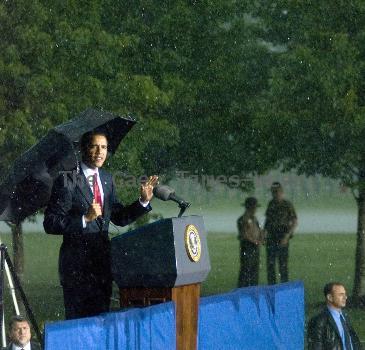Atomic Apology? US to send first delegation to Hiroshima A-Bomb memorial
By Eric Talmadge, APWednesday, August 4, 2010
US to send first delegation to Hiroshima memorial
TOKYO — Survivors of the atomic bombings of Hiroshima and Nagasaki are welcoming a decision by the United States to send its first ever delegation to a ceremony marking the anniversary of the attacks, but are asking for something they aren’t likely to get — an apology.
Tokyo has praised the decision to send U.S. Ambassador John Roos to the Hiroshima anniversary on Friday, though some survivors of the attack, which is seen by many in Japan as an unjustified use of excessive force against a civilian population, say they have mixed feelings.
“They best thing they could do would be to apologize,” said Terumi Tanaka, who survived the 1945 atomic bombing of Nagasaki at age 13 and is now secretary-general of the Japan Confederation of A- and H-Bomb Sufferers Associations. “But I doubt that is going to happen.”
Tanaka, whose organization is the only nationwide network of atomic bomb survivors, said the decision to send Roos is a positive sign of U.S. resolve to abolish nuclear weapons.
“We welcome the visit. But without an apology, it is difficult for us,” he said. “We aren’t asking for reparations. We simply want the U.S. to apologize and get rid of its nuclear arsenal.”
U.S. officials say they felt it was “the right thing to do” to send Roos to the ceremony — which begins Friday morning with the ringing of a bell and the release of doves. They also hope the move will underscore President Barack Obama’s call for a world without nuclear weapons.
Roos visited Hiroshima just weeks after he arrived in Tokyo in 2009, and the response was generally positive. But this is the first time the U.S. will send a delegation to the anniversary ceremony itself.
About 140,000 people were killed or died within months when an American B-29 bombed Hiroshima on Aug. 6, 1945. Three days later, about 80,000 people died after the United States attacked Nagasaki. Japan surrendered on Aug. 15, ending World War II.
Hiroshima officials on Wednesday said this year representatives of 75 countries will attend the ceremony, along with U.N. Secretary-General Ban Ki-moon. Representatives from nuclear powers France and Britain will also attend for the first time.
Hiroshima Mayor Tadatoshi Akiba singled out Roos’ decision to participate as particularly significant.
“The attendance of Ambassador Roos will further strengthen world opinion toward the abolition of nuclear weapons and, we strongly hope, deepen the resolve of the government of Washington, as a nuclear power, to destroy such weapons,” Akiba said in a statement.
Noriyuki Shikata, a spokesman for the prime minister, said the trip is a meaningful chance to influence public opinion toward a nuclear-weapon-free world.
“Since 65 years have passed, rather than demanding the U.S. apologize, at this point it is important to send a message to the world, and to the younger generation, that this must never be repeated,” he said.
Roos is not scheduled to speak at the event.
After touring the Hiroshima Peace Museum last October during his first trip to the city, Roos wrote in a guest book that he was deeply moved.
“A visit to Hiroshima is a powerful reminder of the destructiveness of nuclear weapons, and underscores the importance of working together to seek the peace and security of a world without them,” he said, according to a statement issued by the U.S. Embassy.
Roos’ willingness to travel to Hiroshima has raised hopes that Obama — who is expected to visit Japan in November — may be next.
Calls have grown in Japan for Obama to visit Hiroshima and Nagasaki since his speech in Prague envisioning a nuclear-free world and since he was awarded the Nobel Peace Prize. The mayors of both cities have invited him and Japanese newspaper editorials and anti-nuclear groups have pointed out that previous Nobel Peace Prize winners have visited the cities.
“President Obama should go to Hiroshima and Nagasaki himself, as the mayors of those two cities have officially invited him to do, and he should meet with the Hibakusha, survivors of the bombings, to hear their plea that these horrific weapons be abolished so that no one ever suffers as they have,” said Kevin Martin, executive director of Peace Action, a Washington-based activist group.
But the apology issue could squelch any such plans.
Signs of sympathy toward Japanese suffering could be seen as criticism of the U.S. decision to drop the bombs — viewed by many Americans as a pragmatic move to hasten the end of the war that the U.S. entered after Japan attacked Pearl Harbor on Dec. 7, 1941.
Others see the bombings as crimes against humanity.
“I don’t think it would be unreasonable to expect an apology,” said Yasunari Fujimoto, secretary-general of the Japan Congress Against A- and H-Bombs. “But what is most important now is that the U.S. is being represented, the suffering of the victims will be acknowledged, and the process toward getting rid of nuclear weapons will get a boost.”
Former President Jimmy Carter visited the atomic bomb memorial at the Hiroshima Peace Museum in 1984, after he was out of office. The highest-ranking American to visit while in office is House Speaker Nancy Pelosi, who went last year.
Tags: Asia, Barack Obama, East Asia, Gun Politics, Japan, Municipal Governments, North America, Nuclear Weapons, Political Issues, Tokyo, United States, Weapons Of Mass Destruction

